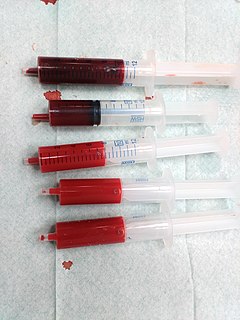
Blood is a body fluid in the circulatory system of humans and other vertebrates that delivers necessary substances such as nutrients and oxygen to the cells, and transports metabolic waste products away from those same cells.
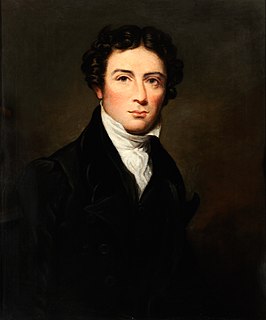
Michael Faraday was an English scientist who contributed to the study of electromagnetism and electrochemistry. His main discoveries include the principles underlying electromagnetic induction, diamagnetism and electrolysis.
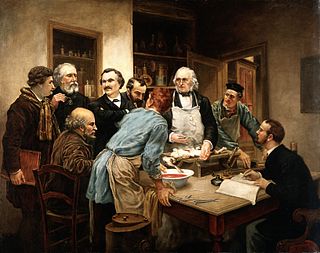
Physiology is the scientific study of functions and mechanisms in a living system. As a sub-discipline of biology, physiology focuses on how organisms, organ systems, individual organs, cells, and biomolecules carry out the chemical and physical functions in a living system. According to the classes of organisms, the field can be divided into medical physiology, animal physiology, plant physiology, cell physiology, and comparative physiology.

Richard Dawkins is a British evolutionary biologist and author. He is an emeritus fellow of New College, Oxford and was Professor for Public Understanding of Science in the University of Oxford from 1995 to 2008. An atheist, he is well known for his criticism of creationism and intelligent design.

The Nobel Prize in Physiology or Medicine is awarded yearly by the Nobel Assembly at the Karolinska Institute for outstanding discoveries in physiology or medicine. The Nobel Prize is not a single prize, but five separate prizes that, according to Alfred Nobel's 1895 will, are awarded "to those who, during the preceding year, have conferred the greatest benefit to humankind". Nobel Prizes are awarded in the fields of Physics, Chemistry, Physiology or Medicine, Literature, and Peace.
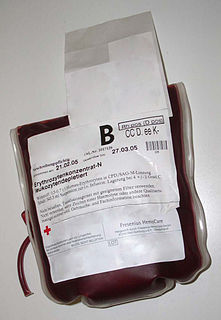
Blood transfusion is the process of transferring blood products into a person's circulation intravenously. Transfusions are used for various medical conditions to replace lost components of the blood. Early transfusions used whole blood, but modern medical practice commonly uses only components of the blood, such as red blood cells, white blood cells, plasma, clotting factors and platelets.
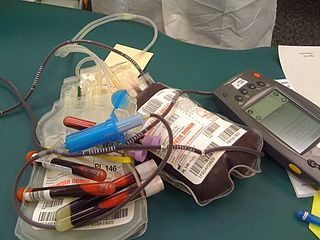
Whole blood (WB) is human blood from a standard blood donation. It is used in the treatment of massive bleeding, in exchange transfusion, and when people donate blood to themselves. One unit of whole blood brings up hemoglobin levels by about 10 g/L. Cross matching is typically done before the blood is given. It is given by injection into a vein.
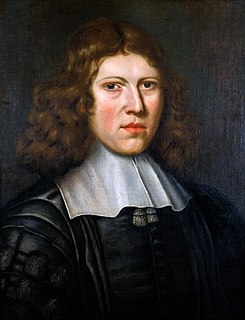
Richard Lower was an English physician who heavily influenced the development of medical science. He is most remembered for his pioneering work on blood transfusion and the function of the cardiopulmonary system, which he described in his book Tractatus de Corde.

William Benjamin Carpenter CB FRS was an English physician, invertebrate zoologist and physiologist. He was instrumental in the early stages of the unified University of London.
Sir Richard Brook Sykes, is a British microbiologist, the chair of the Royal Institution, the UK Stem Cell Foundation, and the trustees at King Edward VII's Hospital, and chancellor of Brunel University. As of June 2021, he is chair of the UK's Vaccine Taskforce, where he is responsible for overseeing the delivery of the COVID-19 vaccination programme, including preparations for booster programmes and encouraging vaccine innovation in the UK.

Baruch Samuel Blumberg, known as Barry Blumberg, was an American physician, geneticist, and co-recipient of the 1976 Nobel Prize in Physiology or Medicine, for his work on the hepatitis B virus while an investigator at the NIH. He was president of the American Philosophical Society from 2005 until his death.

Paul Charles William Davies is an English physicist, writer and broadcaster, a professor in Arizona State University and Director of BEYOND: Center for Fundamental Concepts in Science. He is affiliated with the Institute for Quantum Studies in Chapman University in California. He previously held academic appointments in the University of Cambridge, University College London, University of Newcastle upon Tyne, University of Adelaide and Macquarie University. His research interests are in the fields of cosmology, quantum field theory, and astrobiology.

Russian cosmism, also cosmism, is a philosophical and cultural movement that emerged in Russia at the turn of the 19th century, and again, at the beginning of the 20th century. At the beginning of the 20th century, there was a burst of scientific investigation into interplanetary travel, largely driven by fiction writers such as Jules Verne and H. G. Wells as well as philosophical movements like the Russian cosmism.
The Faraday Institute for Science and Religion is an interdisciplinary academic research institute based in Cambridge, England. It is named after the 19th century English scientist Michael Faraday.

Bernard Elliot Rollin was an American philosopher, who was emeritus professor of philosophy, animal sciences, and biomedical sciences at Colorado State University. He was considered to be the "father of veterinary medical ethics".

Karl Landsteiner was an Austrian biologist, physician, and immunologist. He distinguished the main blood groups in 1900, having developed the modern system of classification of blood groups from his identification of the presence of agglutinins in the blood, and in 1937 identified, with Alexander S. Wiener, the Rhesus factor, thus enabling physicians to transfuse blood without endangering the patient's life. With Constantin Levaditi and Erwin Popper, he discovered the polio virus in 1909. He received the Aronson Prize in 1926. In 1930, he received the Nobel Prize in Physiology or Medicine. He was posthumously awarded the Lasker Award in 1946, and has been described as the father of transfusion medicine.
Dr Earle Hackett was an Irish-born pathologist and haematologist who migrated to Australia, where he held several responsible administrative positions. He is best remembered as a radio broadcaster on medical subjects, particularly on The Body Program for ABC which he wrote and presented from 1971 to 1982. He was the author of a number of books based on those programmes, and several biographies for the Australian Dictionary of Biography.

(Thomas) Michael Dexter FRS is a British haematologist and director of the Wellcome Trust, from 1998 to 2003.
Al-Risalah al-Dhahabiah is a medical dissertation on health and remedies attributed to Ali ibn Musa al-Ridha (765–818), the eighth Imam of Shia. He wrote this dissertation in accordance with the demand of Ma'mun, the caliph of the time. It is revered as the most precious Islamic literature in the science of medicine, and was entitled "the golden treatise" as Ma'mun had ordered it written in gold ink. The chain of narrators is said to reach Muhammad ibn Jumhoor or al-Hassan ibn Muhammad al-Nawfali who is described as "highly esteemed and trustworthy" by al-Najjashi.

The Universal Kinship is a 1906 book by American zoologist, philosopher, educator and socialist J. Howard Moore. In the book, Moore advocated for a secular sentiocentric philosophy, called the Universal Kinship, which mandated the ethical consideration and treatment of all sentient beings based on Darwinian principles of shared evolutionary kinship, and a universal application of the Golden Rule; a direct challenge to anthropocentric hierarchies and ethics. The book was endorsed by Henry S. Salt, Mark Twain and Jack London, Eugene V. Debs and Mona Caird. Moore expanded on his ideas in The New Ethics, published in 1907.
















